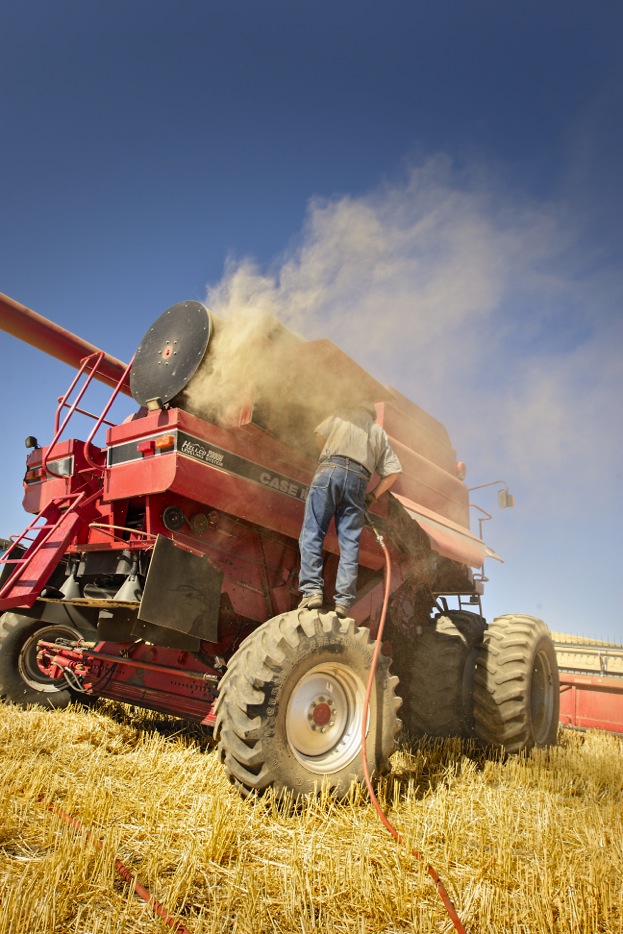2013 Harvest Comes to an End

My harvest for 2013 is over. No one was killed, maimed, or injured, thank God. Though my harvest has been over for almost 3 weeks, I still have some neighbors who were caught by this year’s early September rains and are waiting to finish up. Rain is a double-edged sword right now: great for planting fall crops, terrible for getting harvest over. Cooler nights, and shorter days mean things don’t dry out quickly like they did in early August.
I have been asked, “what do you do now that harvest is over, count your money?” The short answer is, “start fall work,” though that doesn’t really tell you much. To a farmer, “fall work” generally means getting the land ready for the next crop, and planting the 2014 winter wheat crop. But “fall work” encompasses a lot of other things as well.
The first post-harvest chore (and “chore” is a very kind word for it) is to spend a day with the big air compressor blowing the dirt and chaff from every nook and cranny of the combine, the trucks and anything else that had direct contact with harvest. If you don’t do this, harvest and its not so romantic dirt will follow you all year long – like some frosty morning when you head to the field with a truck load of winter wheat seed and turn on the defroster, filling the cab again with last harvest’s chaff.
Harvest will follow you into the shop. Park a dirty combine in the shop one evening and the next morning the floor will be covered with chaff and mouse droppings. Without a thorough cleaning, your average combine holds enough kernels of grain to comfortably feed a freely breeding mouse population all winter. As a homeowner, you may have seen a few mice, but until you have worked on a piece of farm equipment where mice have moved in and raised a family (NONE of them are ever potty trained), you just can’t appreciate the smell.
Before harvest was over, my field man began taking soil samples from the 2013 pea fields that are about to be seeded to winter wheat. Right after harvest, he and I went over the results and decided how much nitrogen, phosphorous, and sulfur would be needed for next year’s crop, and how much I would be willing to spend on it.
Fall is also one of the best times to do perennial weed control. As the days get shorter, these perennial plants put more of their energy into growing new roots than stems, leaves and seed. As a result, herbicides applied now tend to move down into the roots better than at other times of the plant’s growth cycle, giving me better long term weed control. Long story short: I spend three or four days driving my ATV over the entire farm, spraying patches of perennial weeds. The rain showers seemed to have encouraged them this year, and I have sprayed more field bindweed than ever. Bindweed is a dirty little weed that can overtake large patches of ground in a hurry.
Catching up on all the desk work I let slide during harvest can occupy more time than I like. It is especially hard to do when the weather is decent outside. I know the nice days will soon end, and there are some outdoor jobs that are just better with the right weather.
For example, turning this year’s pea fields into next year’s winter wheat crop requires hot, dry weather. If you fertilize or cultivate the ground when the pea residue isn’t completely dry, it tends to bunch up into piles. Bunching into piles means the ground between the piles is bare ground and much more subject to erosion than if the erosion stopping residue is more evenly spread. Not only that, seed drilled into those residue piles has a hard time making a viable plant without some soil to sink roots into. At harvest time next year, this fall’s residue piles will be blank spots in the wheat field, most likely filled in with late emerging weeds that can show up in your harvest sample, reducing the overall quality and the grade and the price. The reduced quality might cause a batch of Japanese sponge cakes to fall and the baker would complain to the miller because his cakes won’t sell, and the miller would complain to the Japanese Government food agency (the Japanese Government buys all imported food grains) and they would refuse to buy U.S. origin wheat which would cause the Taiwanese, Korean, Malaysian, and who knows how many other buyers, to quit buying U.S. Soft White wheat, AND IT WOULD ALL BE BECAUSE OF ME! My neighbors would hate me, and my landlords would fire me, and I would be looking for a part time job as a Walmart greeter and signing up for the biggest USDA farm bill program of all--food stamps.
Seriously, getting the seed in the ground for next year is the big push right now, but as you may have guessed from the previous paragraph, there is a little more time right now to enjoy a few beers with friends and neighbors. After all, someone HAS to support the barley industry.
